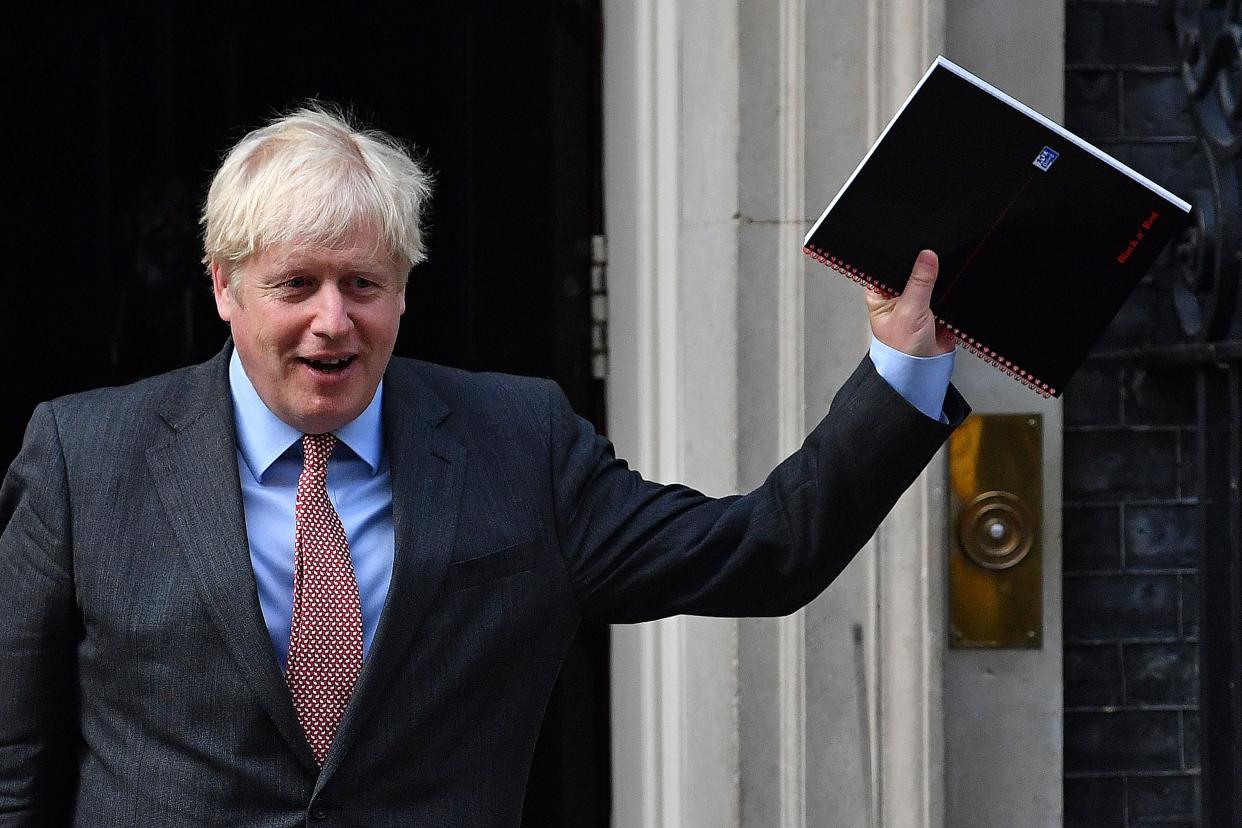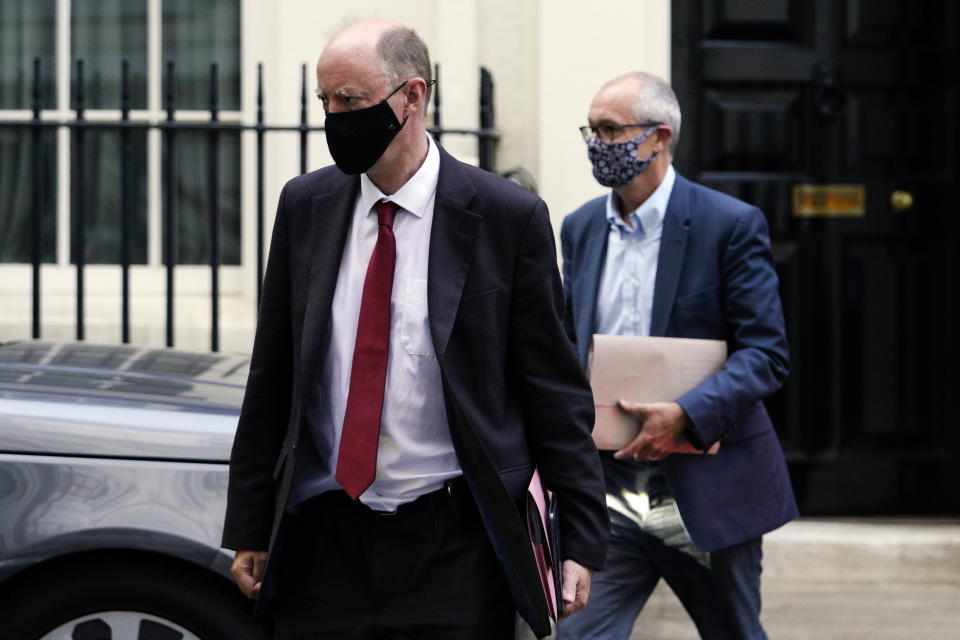Coronavirus: Johnson to tighten restrictions as fears grow of deadly second wave

Boris Johnson is to tighten lockdown restrictions in England in the wake of growing fears of a deadly second wave of coronavirus sweeping across the UK this winter.
The move came after the chief medical officers of all four nations of the UK lifted the Covid-19 alert level to 4, indicating the pandemic is in general circulation with transmission “high or rising exponentially”.
And in a chilling warning, the prime minister’s chief scientific adviser Sir Patrick Vallance warned that unless more is done to curb the rate of spread of the infection, cases could rise to 50,000 daily by mid-October – many times the 6,000 officially recorded at the height of the first wave in April and May, with an inevitable rise in hospitalisations and deaths.
In changes to be outlined to MPs in parliament ahead of an early-evening TV address to the nation, Mr Johnson will announce a 10pm curfew for pubs, cafes and restaurants across England.
Under the new rules, which come into effect on Thursday, hospitality venues will also be restricted by law to table service only.
The PM will set out to the public further ways in which the virus can be confronted, including by following social distancing guidelines, wearing face coverings and washing hands.
But he is likely to face accusations that he is not going far enough, after Prof Vallance said that speedy action would be needed to rein in infections which are currently doubling every seven days.
Associate microbiology professor Simon Clarke of the University of Reading said: “It’s becoming increasingly clear that at present we’re living our lives in a way that allows coronavirus to spread quickly through the population.
“Unless we’ve collectively decided to change our position on preventing as many deaths as possible, then it suggests that stricter distancing measures will be necessary.”
In a further sign that experts fear the current wave of illness will continue to hold the UK in its grip past Christmas, the chief medical officer for England Chris Whitty said the public should view it as “a six-month problem that we have to deal with collectively”.
Sir Patrick stressed that the 50,000 figure was not a prediction, but said it could become reality within weeks – and would quickly usher in a rise in deaths to 200-plus a day.
The latest official figures showed 4,368 confirmed new coronavirus cases and 11 deaths in the UK across a 24-hour period.
But Prof Vallance said that if current trends continue unabated, the number of cases could rise to “10,000 next week, 20,000 the week after, 40,000 the week after that”.
“You can see that by mid-October, if that continued, you would end up with something like 50,000 cases in the middle of October per day,” he said.
“Fifty thousand cases per day would be expected to lead a month later – so the middle of November, say – to 200-plus deaths.”
Data from France and Spain has shown that the spike in infections among younger people, which happened in those countries a few weeks earlier than in the UK, has now spread to more vulnerable elderly populations and is causing a rise in hospitalisations and deaths, he said.
“The challenge is to make sure the doubling time does not stay at seven days,” said Vallance in a joint briefing from 10 Downing Street with Whitty.
“That requires speed, it requires action, and it requires enough in order to be able to bring that down.”

Mr Johnson’s decision to reverse some of the lockdown relaxations introduced in the summer came after he was briefed by Vallance, Whitty and chief economist Clare Lombardelli on Saturday, and then held a seminar with scientists and chancellor Rishi Sunak on Sunday.
On Tuesday, he will chair the first meeting of the government’s Cobra emergency committee since May to discuss the escalating coronavirus crisis, with leaders of devolved administrations in Scotland, Wales and Northern Ireland taking part.
London mayor Sadiq Khan, who on Monday agreed a “new London plan to slow the spread of the virus” with council chiefs and public health experts, will be speaking to the PM on Tuesday and has demanded to be invited to the crucial Cobra discussion.
“Without adequate testing or contact tracing in London, we have no choice but to look at other measures to slow the spread of the virus,” said Mr Khan. “I firmly believe that acting early, rather than having to impose more stringent measures later, is the right thing to do both for public health and the economy.”
Responding to the PM’s announcement, Liberal Democrat leader Sir Ed Davey said: “For millions of people this will feel like a step backwards. After months of disruption to our daily lives many will feel anxious and worried about this latest development. The govenrment must immediately put forward a detailed plan to fix the track and trace system, which is the only way to avoid further measures being necessary.”
Meanwhile, leaked documents prepared for Nicola Sturgeon revealed that the Scottish government is considering a “rolling lockdown”, which could shut pubs, restaurants, entertainment venues, playgrounds and church services for two weeks.
The memo set out a possible “circuit break” to coincide with school holidays in different areas, along with travel restrictions, a ban on contact sports and a “general message to stay at home as much as possible”.
News of the tightening of restrictions came as health secretary Matt Hancock released details of the rationing of coronavirus tests in a bid to lift the service out of the chaos of the past few weeks, which have seen people who believe they have symptoms told to travel hundreds of miles for a check.
Confirming that hospital patients, care home staff and residents, NHS staff and teachers will get priority, the Department of Health and Social Care urged members of the public to come forward for testing “only if they have symptoms” and made clear that those in hotspot areas will get a higher place in the queue.
“Currently demand for community testing outweighs supply and action may be needed to ensure that tests are directed to protect those most at risk,” the department admitted.
Meanwhile, Dido Harding, the head of the NHS Test and Trace system, suggested that asymptomatic people may have to pay to be checked under the government’s “Moonshot” programme to deliver 10 million tests a day. Mr Johnson has previously indicated that the quick-turnaround tests would enable people to attend conferences, theatre or sporting events free of the concern that they might be contagious.
In comments to the CBI, obtained by the i newspaper, Baroness Harding said that while those with symptoms would always be able to get free tests from the NHS, for others the Moonshot tests “may be a normal cost of doing business to be able to have non-socially distanced activities”.
Labour’s public health spokesman Alex Norris said: “Instead of threatening to charge people for coronavirus tests, the government should be focused on fixing the system.
“The current testing fiasco will not be sorted by creating a two-tier ‘pay-to-hug’ system for families across the country.
“When Boris Johnson makes his statement he needs to rule this proposal out and put forward a credible plan to expand testing.”
Read more
Boris Johnson has found a way to reassure the nation over coronavirus – by not turning up
‘Authoritarianism’: Tory backbench anger over coronavirus restrictions bursts into the open


